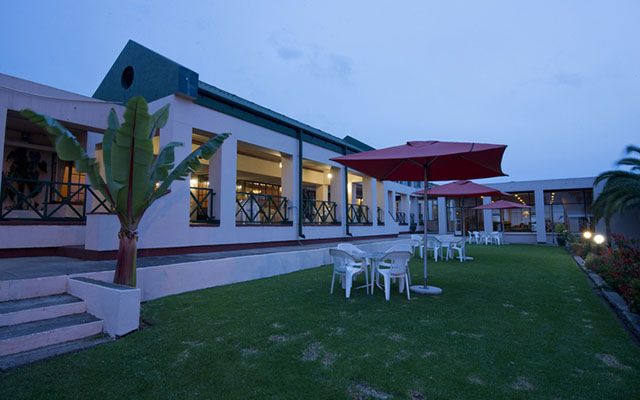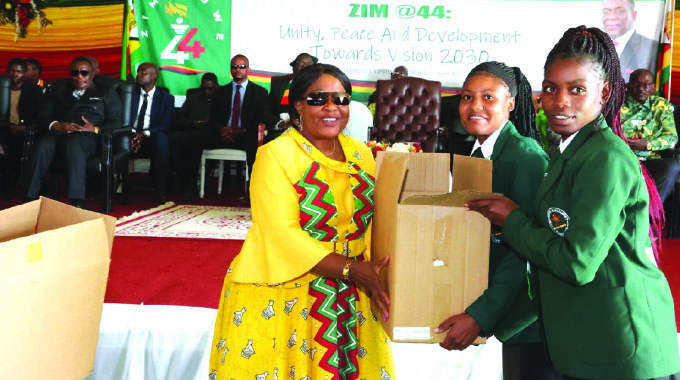‘Govt must inject more funds into health’


DR MUNATSI . . . “To improve the situation in the hospitals, definitely resource allocation has to improve because we need to buy a number of things.”
Christopher Farai Charamba THE INTERVIEW
Junior doctors this week ended their industrial action and returned to work. Some of their demands had been addressed by the Government, but there were still concerns that were left unattended to. Christopher Charamba (CC) spoke to Zimbabwe Hospital Doctors’ Association president Dr Edgar Munatsi (EM) to understand what the current position of the doctors was and the way forward.
CC: Dr Munatsi, the industrial action that doctors took has now ended. What were your demands that led to you taking industrial action? Have these been met and, if not, what is the way forward?
EM: To answer your last question, the demands have not been fully met. When the members decided that they had to push the Government to resolve some of the issues, there were three main issues that we tabled to the Government.
The first had to do with employment post internship for the doctors. They have created 250 posts which we understand will cover this year and some part of next year. As you can see, this is a very short-term solution but the problem is quite a chronic one.
This issue has been discussed for the past three years. So our wish is to see Government coming up with sustainable solutions particularly around the issue of post-internship employment. Especially considering that the universities are still enrolling and producing more and more doctors.
So we hope that in the near future, preferably before the end of this year they will then come up with a clear plan of what they are going to do. Whether they are going to give people practising certificates beyond internship or they are going to create more posts which would be the ideal scenario because we know that the doctor patient ratio is still bad.
CC: Are 250 posts enough for this current crop of doctors that need post-internship employment?
EM: It can be enough but we might get a situation where a few cadres fail to secure posts. But we hope that between now and next year, some people will also leave the districts creating more space. So we hope these posts will be enough because we have approximately 240 doctors who are going to be finishing their internship this year and next year.
The second issue that we discussed with the Government had to do with their promise in 2014 to increase the on-call allowances from the current rate of $288 per month which is a flat free. They had indicated that they were going to make efforts to gradually increase this allowance to $720 per month.
But since 2014 there were no attempts to move a bit towards that. So this was one of the contentious issues that we were discussing with Government.
The third issue had to do with assistance in terms of procurement of personal cars for doctors. Doctors wanted to buy their own cars but they wanted the Government to then help them with payment of tax to Zimra in the form of duty exemption or maybe a staggered way of paying this duty.
With regards to these two last issues the Government came with an offer in terms of on- call allowances saying they can afford to increase it by $72 per month from $288 to $360. But this is still way below what with expected to get.
On the issue of assistance to procure vehicles, they proposed a situation where they would facilitate a loan scheme for doctors to buy their cars. This is not a desired scheme for us because it comes back to the same situation where doctors are saying they cannot afford this.
It will perhaps alleviate the pressure a little bit in terms of raising the resources at once but ideally we feel that Government, if they so wish and there is commitment, they can still provide duty exemption for doctors. We feel that this is a non-monetary incentive to try retain the cadres, especially those who are working very hard in rural communities and our central hospitals.
CC: You said not all your demands have been met but you decided to end the industrial action. Was this a unanimous decision? And seeing as your demands had not been met, why did you make the decision to end the strike?
EM: The decision to end the industrial action was merely based on the plight of the patient. When we go on strike we leave a few cadres on the ground to try and assist them with their emergencies.
But we realised that the mortality was on the rise in the central hospitals and we were not making much headway in terms of discussions. They were going to drag for longer than we expected.
There was also an issue to deal with career progression of our cadres because most of the people who were on industrial action are people who were doing their internship. So we had to consider all these issues.
We decided that we could continue negotiating with Government while people are progressing with their lives. This decision was tabled by our members and people discussed it. We realised that the majority of our people really considered that we have to put the plight of the patient first and then we continue negotiating with the Government for the improvement of our conditions of service.
CC: One of the reports that came out was that those on industrial action for two weeks then had to do a further three months of their internship. That has since been rescinded. But what was the issue around that and what caused the government to turn around from this position?
EM: Those are actually the regulations that if a doctor does not turn up for work for more than 14 days, they then have to repeat the rotation that they are doing for three months. But our industrial action actually happened at the tail end of our rotations. People were almost finishing their internship.
We then had to meet with Government to discuss whether they could compromise on that and allow our cadres to proceed with their lives. They did hear our call and said people would do 26 more days to finish their internship and then they can be deployed to the next stage of their lives.
CC: Another issue that was raised had to do with practising certificates. Doctors, I believe, said that if the Government could not provide posts then they should simply issue practising certificates. In light of what is transpiring now, what is your position on this issue? Do you think practising certificates should be issued immediately after the two-year internship or is it still necessary for doctors to first go out to the districts?
EM: I think there are two issues here. It is very important for doctors to go out to districts, work there and serve our rural communities but at the same time we strongly feel that people should be given practising certificates after the two years of internship.
Government should then provide incentives for doctors to go and work in the rural areas whether they have practising certificates or not. Having a practising certificate does not exclude someone from working at a district hospital.
So we feel that provision of a practising certificate is actually the solution in this scenario where the Government is struggling to absorb everyone. It at least gives the doctor an opportunity and options in terms of career progression. If they want to go and specialise that is their wish, they can also work in the district hospitals or seek greener pastures, which is sad but still an option.
CC: What are some of the incentives that you think would attract doctors to work out in the districts?
EM: The Government should provide monetary and non-monetary incentives to return the cadres. For instance, in terms of distance, if we are to say Harare is the central point then the farther away one is from Harare then people should be getting money that is proportional to the distance from Harare.
If you are deep in the rural areas, then monetary incentives are necessary both monetary and provision of the duty free on vehicles for you to be able to move and also send your children to good schools.
CC: Looking at the situation in the hospitals, what sort of conditions do the internship doctors find in themselves working in?
EM: The conditions in the hospitals right now are quite dire because you find that most of the time our hospitals are not fully equipped especially in terms of medication and consumables. Hospitals are failing to provide gloves, for instance, or protective masks. Hospitals are also failing to provide simple things like drips.
So you can imagine this is a very difficult situation for interns to work under. We have to rely on a patient who doesn’t have the money anyway because our clientele who come to central hospitals are referred from rural hospitals.
CC: So how are you managing under such conditions?
EM: It is very difficult, in some instances we rely on patients’ relatives to try and raise the money to do simple investigations, to buy medication, to buy things like needles and syringes. Sometimes the doctors also come together and raise money to assist their patients because they care for them.
CC: The Government has said that a huge hindrance they are facing is that Treasury does not have the capacity, for example on the issue of on-call allowances. Do you feel that their statements and position on the matter is genuine and are you as the doctors willing to compromise further with the Government on some of these things?
EM: It is common knowledge that we are facing a difficult economic situation but we also feel that the Government is not quite sincere in terms of prioritisation of the health sector.
To begin with, when they allocate resources to the health sector, according to the Abuja Declaration, the health budget is supposed to be 15 percent of the country’s budget but this is not happening.
So we feel that to a certain extent, as much as the economic situation is difficult it is an issue of priorities. The Government still isn’t prioritising the health sector the way it should. We see some sectors are actually being prioritised more than the health sector.
CC: Going forward, what do you think can be done to make the work of doctors in the hospitals better and to improve the overall health sector in Zimbabwe?
EM: I think generally it’s an issue to do with allocation of resources because everything that we use requires resources. It’s unfortunate that everything that we are heavily reliant on donor funds.
To improve the situation in the hospitals definitely resource allocation has to improve because we need to buy a number of things. So if the Government could prioritise the purchase of basic things at least at the bare minimum if a person is coming from the rural areas and they need a drip urgently they should get one.
The doctor should be able to look for gloves in the hospital and find them and try and assist the patient. If the Government cannot provide some specialised care, then that’s understandable but at least basic things have to be provided.







Comments